I randomly went to see Grave of the Fireflies at something with Ebert’s face on it in the late nineties when I first moved here, and it was pretty cool. Since moving back to Champaign in 2007, I’ve made it a point to get to at least one Ebertfest movie a year. Over the years, I’ve seen this fest grow incrementally, until we have what happened this year: a well-known industry event where guests aren’t pressured to shill combined with a mini block-party having food trucks, art shows, and opportunities to chat with friends and strangers about a common interest.
When the full schedule was announced this year, I heard repeatedly that folks weren’t impressed or interested or didn’t know a bunch of the movies. And whenever I hear that, I want to stare back at folks and say, “Yeah, that’s the point.” This was Roger’s chance to bring movies into the spotlight and give something back to films he championed, but perhaps the industry didn’t. This year’s emphasis on diversity and empathy truly underscored that goal, because these are people and films that contribute, that are necessary, and yet aren’t globally recognized.
Keeping in mind that people like things they’ve heard of, I know it can be hard to sell “overlooked” films. Yet I still end up at the fest, trusting in a critic’s judgment that I’ve missed something. I’ve noticed that there are four primary reasons I end up at the shows I choose to see:
- Most often: The Speaker – regardless of what film is offered, if I want to see a guest, I’ll go.
- Sometimes: Opportunity – I’ve been meaning to see a thing, but missed it, now I have the time.
- On occasion: Exploration – something or someone I’ve heard about but haven’t pursued.
- Rarely: Re-experience — I want to see a film again, with an audience, and get something from the panel.
- Never: Discovery – shamefully, unlike a good friend of mine, I have never just randomly gone to a film because it was there and I had the time. Most of the time, I need some kind of mental “in” to be willing to spend $15 and an hour prior to showtime to go to a movie.
This year was no different, offering opportunities from each reason I usually find to go, and my first-ever festival pass gave me a chance to rectify the last bullet-point.
WEDNESDAY, APRIL 13TH
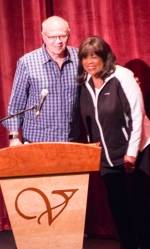 Opening remarks
Opening remarks
Clearly, I was here to see Crimson Peak and Guillermo del Toro, but I was glad to hear Chaz’s welcome and opening remarks. I’ve already reacted to her speech, and applauded her for her commitment to our community despite some confusing messages we’ve been sending. Emotional about continuing the tradition without Roger, she talked about his intentions and wishes that she keep it going for as long as she enjoys it. I love hearing her speak, and what she brings and her thoughts, and I think she is an incredible emissary for the spirit of this festival.
(Pictured with festival director Nate Kohn)
Crimson Peak
Reasons for going:
Speaker – Guillermo del Toro was the biggest name this year, and someone about whom I was curious.
Re-experience – I saw Crimson Peak in a theatre with 5 other viewers, Ebertfest audiences are better.
This was one of the two films on this year’s slate that I’d already seen, and the one I was most interested in re-experiencing. I was joined by many during the jump-out thrills (despite del Toro’s assertion that “this is not a fucking horror film, it’s a fairy tale”, there are definitely some moments meant to scare) and folks found humor in some moments I’d never considered funny before. Of course, del Toro himself was an experience, and aside from his quotable moments, it was a joy to see him speak about his work. He is truly in love with what he does, and is eager to share his thoughts and feelings with everyone. It was rewarding in a way that I rarely find at a panel interview.
THURSDAY, APRIL 14TH
Grandma
Reasons for (not) going: Re-experience ; personal opinions
Grandma is the other film that I’d already seen, and I loved it enough that I thought I should maybe go see Paul Weitz talk about it afterwards. But there is something intensely personal and affecting about this film, something I’m still not sure I was ready to share with a theatre full of people. Abortion and women’s rights are national conversations right now, and while I realize that Weitz’s script shows he is a supporter of women’s agency, there is a part of me that is so very angry that all of the talking on this topic is controlled by guys. Locally, both guests for this film were dudes, and even the rogerebert.com review was written by a man. If there had been one woman panelist for this film, I would have been there like a shot, but it was disheartening to think that there were no female voices present to discuss this important and helpful film.
You don’t know unless you go, though, as below shows, and it turns out the discussion was moderated by a female critic. If anyone went, I’d love to hear how it turned out.
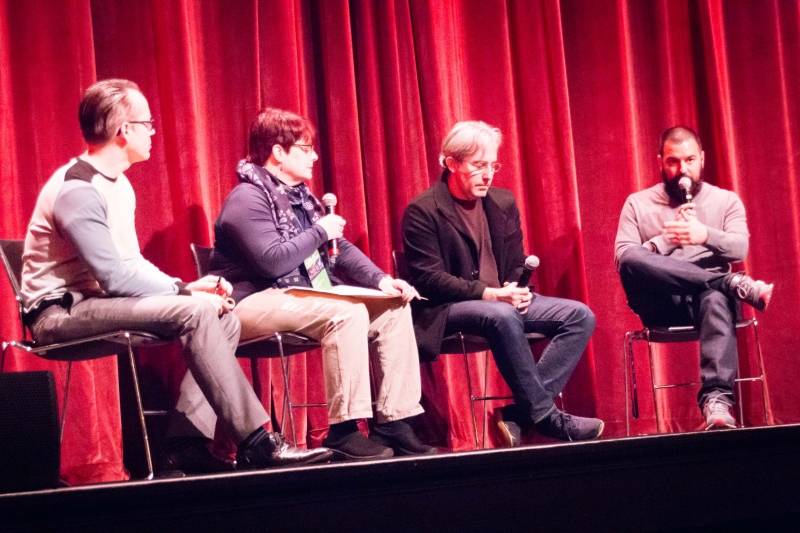
Northfork
Reason for going:
Exploration – I love many of the cast members of this film, which is enough to get me to go; Roger’s critical comparisons were gravy.
Roger’s quoted comparison of it to Days of Heaven and Wings of Desire piqued my interest, and though I was skeptical that it could live up to my estimation of either of these films, I made time to get there between two other obligations. Like I thought, this film doesn’t quite reach the bar set by either film in my own ranking system, but it was pensive, gorgeous, and weird – characteristics which I regard highly. I had to leave right as Michael Polish was answering the question “How exactly did you get this cast?” and he began by talking about Darryl Hannah’s preoccupation with the film, but I missed out on hearing about the plethora of amazing actors who were often only on the screen for a few minutes. I left feeling like I had watched a 2-hour Edward Hopper painting, and still knew little to nothing about the people depicted. It was amazing.
 The Third Man
The Third Man
Reason for (not) going: Schedule conflict
I had to leave Northfork early to go cover Parkland’s Fiddler on the Roof – and for many reasons, I wish I hadn’t. My colleagues who did go were a little off-put by the very quiet sound, I’m not sure if there were issues? Still, a classic thriller with Orson Welles and the promise of a panelist who could talk about the way things were for women “back in the day” was a tough sacrifice for me.
FRIDAY, APRIL 15TH
Disturbing the Peace
Reason for going:
Speaker – I’m relatively uninformed about the Israel/Palestine conflict, hearing it from participants is the closest thing to truth I think I can get.
Discovery – I wanted to go to something unknown, just to go
I will admit: my interest in non-fiction films and books is very limited; I have a thing about “truth” and how it’s different from “facts”. When I read about Disturbing the Peace, however, I knew that this would be a rare documentary where one led to the other. The premise is that propaganda feeds the conflict in the Middle East, internally and externally, and participants in the conflict have decided to change the story that they tell themselves. The film opens with two different cars driving toward each other, one containing Israeli ex-soldiers and the other containing participants from Palestine. Both sides are making eerily similar statements about being afraid for their lives, thinking it might be a trap, knowing that they could be driving to their deaths, but that the possibility of an alternative is better than a certain future filled with violence.
The film was so moving that when Chaz asked 20 people from the audience to come on stage to show our support for their combined effort, I didn’t even hesitate, it just felt necessary to express in some small way how affecting the story was. Chen Alon, an Israeli ex-soldier, talked about how courage and altruism don’t enter into his actions – he’s taking action for his own sake and for his family. After the screening, he said, “I feel like I need more breath to say new things after the film.” Sulaiman (Suli) Khatib was there from Palestine, a participant who was sentenced to 15 years in prison at 15 years old for his involvement. He spoke about how difficult it is to see the other side as human, but after his experiences with Combatants for Peace has become “the director of the love part” of this organization. Hearing them speak for the next hour made it worth cutting into our break between films, and I’m happy to direct you to their facebook and Indiegogo pages.
This film broke all kinds of Eberfest standards —being a “premiere”, something that Roger wanted to avoid, and the first recipient of the “Roger Ebert Humanitarian Award”— both with very good reason. This film will have its Middle Eastern premiere in July, and is being submitted to other festivals, so hopefully folks who missed this showing will soon be able to see it for themselves. Once Chaz saw it, however, she knew it was time to institute an award that Ebert had conceived. The “thumbs” handed out to this film were inscribed with “Roger Ebert Humanitarian Award”, and each panelist also received a handkerchief of Roger’s, to represent the extraordinary empathy that this documentary brings to the screen.
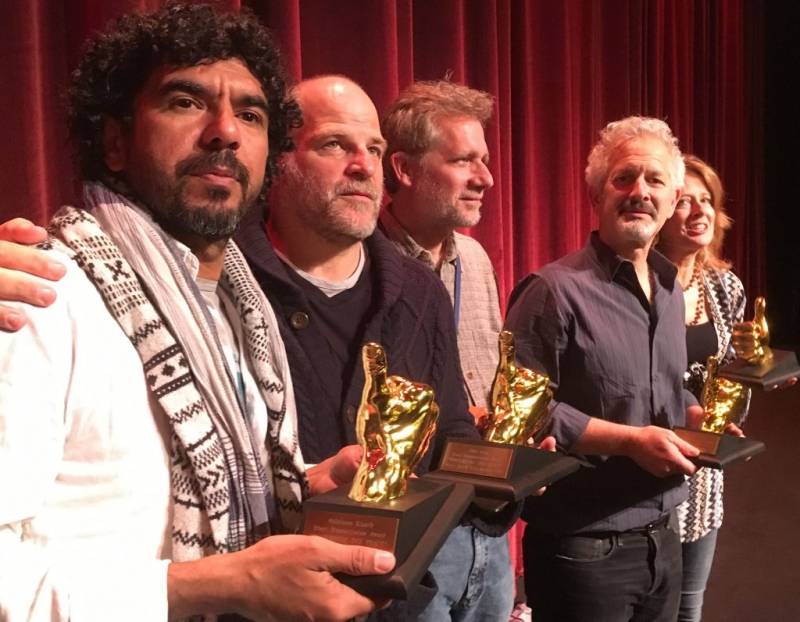
(Receiving the Humanitarian award, image from Chaz’s twitter)
L’inhumaine
Reason for going:
Speaker — by “speaker”, I mean Alloy Orchestra, but I was pleasantly surprised by Michael Barker Richard Neupert.
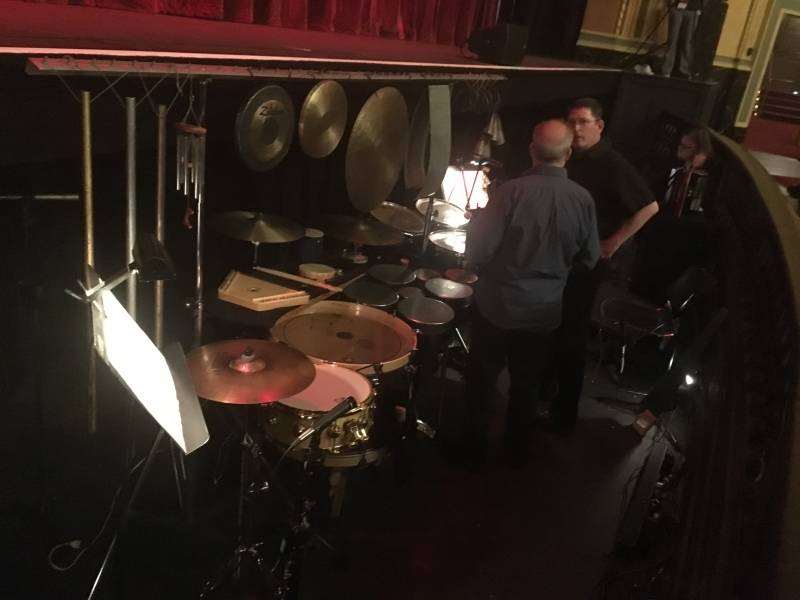
The Alloy Orchestra has made appearances at all but two Ebertfests, and despite the fact that I enjoy silent films with live accompaniment, I have never made it to one of their showings. This film was over two hours, and even with coffee, caffeinated soda, and an incredibly stimulating instrumental score, there were a few minutes of its 135 where I’m not sure I saw everything. One thing I had absolutely no trouble paying attention to was the introduction. Michael Barker of Sony Pictures Classics Richard Neupert was animated, invested, and enthusiastic about his subject material, making even early French filmmaking philosophy interesting to someone who usually finds historical background boring (that would be me). I loved the look of the film, especially the scientist’s lab which was very Art Deco and imaginative. But truly, the experience  was perfected by the Alloy Orchestra’s accompaniment, which was so engaging, evocative, and full that I actually feel sorry for people who saw it in the 20s, possibly only with a piano playing along. I have never been more aware of how the music was moving me through a film. If, like me, you “just missed” the Alloy Orchestra in the past, be sure to make it a priority in the future.
was perfected by the Alloy Orchestra’s accompaniment, which was so engaging, evocative, and full that I actually feel sorry for people who saw it in the 20s, possibly only with a piano playing along. I have never been more aware of how the music was moving me through a film. If, like me, you “just missed” the Alloy Orchestra in the past, be sure to make it a priority in the future.
 (Editor’s note and apology: Richard Neupert of UGA gave the introduction, Michael Barker moderated the panel afterwards. Here they are together, Barker on the left and Neupert on the right. They look nothing alike, I am chagrined. Just another reason to buy Neupert a drink, I guess.)
(Editor’s note and apology: Richard Neupert of UGA gave the introduction, Michael Barker moderated the panel afterwards. Here they are together, Barker on the left and Neupert on the right. They look nothing alike, I am chagrined. Just another reason to buy Neupert a drink, I guess.)
Dinner
We pause for 2.5 hours for dinner break. Hendrick House and Piato were parked on Park St., but plenty of people enjoyed dinner downtown, got coffee, shopped at pop-ups, or stopped in for Record Store Day. I got into Guido’s with no problem, and on Sunday sidled up to the bar at Watson’s Shack & Rail.
Eve’s Bayou
Reason for going:
Samuel L. Jackson (technically Exploration) – one step closer to seeing everything he’s been in.
Kasi Lemmons used an amazing script and Jackson’s accelerating star power to get the money to make a film that features primarily women, all of them of color, and that star as the victim. As she said during the panel, “It was a magic time in film history,” referring to the late 90s, when all the large production companies decided they wanted to put big money behind small films because it was trendy. That money came with some strings, however, and this screening offered us the rare opportunity to see the Director’s Cut featuring Uncle Tomi, a disabled character who was entirely removed at the producer’s insistence: an expensive process that even changed the plot of the film. Lemmons remarked that the presence of the Uncle wasn’t from an intentional inclusivity, but that she was just making a movie that looked like her family, and he was part of it. Crazy that even during the indie era, we took two steps forward and one back.
Also – this is just a friendly reminder to attendees asking questions: 1) it should be phrased appropriately and 2) it should actually be a question. “I love your work” is awesome for the filmmaker to hear, but hard to launch a discussion off of, and takes time away from questions that have answers. And I don’t care where you grew up: if you are white, your understanding of “the black experience” is incomplete, regardless of your capacity for empathy. Lemmons, consummate professional, handled both like a boss.
SATURDAY, APRIL 16TH
Force of Destiny
Reason for (not) going: Schedule conflict
After explaining to a friend and festivalgoer that Paul Cox’s film “just honestly did not appeal to me” regardless of Roger’s high esteem for the multiply-invited filmmaker (and documentary subject), I was told that I missed a beautiful film full of joy and empathy. I had already committed to Asha’s Holi celebration, so I was having moments of joy and beauty of my own.
Radical Grace
Reason for (not) going: Schedule conflict
Getting the color dust off never really worked on my hair, to my dismay. This film was somewhat interesting to me, but my reluctance to watch documentaries and my experiences with Western religion helped me legitimize the hair-washing excuse. Another friend let me know that she felt similarly, thinking it would be hard to engage with a religious perspective. “It was shot so simply, though, it really worked,” she told me later, and was really glad she went. The panel discussion did run a little long, which is also always a good sign that people were engaged.
Love & Mercy
Reason for going:
Paul Dano (technically Exploration) – why isn’t he gratuitously famous? Seriously.
Opportunity — I own this movie, I have watched the special features, and I have not been in the right headspace to watch it all the way through.
For this film, the guests had never TBD’d and I was holding out for a chance of nearly-local Cusack or maybe even Brian Wilson. Chaz revealed afterward that Wilson had always been a possibility but didn’t pan out. I’m glad I waited to see this on the big screen, because absorbed between Dano and Cusack, I was pretty much destroyed by this story. All the trailers show the explosive cruelty of Dr. Landy, excruciatingly well-played by Paul Giamatti, but I found that being caught up in the internal journey of Wilson was the devastating part. Like most of the other empathetic films on this year’s schedule, it ends on a decidedly hopeful note. I’m glad there was a 2hr break between this film and the next, because I really needed it to recover.
Blow Out
Reason for going:
Exploration – I like De Palma, I’d just never gotten around to this one.
I’m glad I had the chance to recover, because the next film delivered another emotional beating, especially with one of the most hopeless movie endings I’ve ever seen. The thing I found curious was the repetition that Roger considered Blow Out De Palma’s greatest film, even though that quote comes from a review written before Scarface or Carlito’s Way was made. I caught up with aficionado and blog owner of De Palma a la Mod, Geoff Beran, and asked him if he thinks this still holds true today. “Absolutely,” said Beran, “the popular films were work for hire, but Blow Out is De Palma from his soul.” He went on to explain that as writer and director, De Palma was able to create an homage to Blow Up, one of his favorite films, and to fully explore the theme of never being able to get the whole truth, something that permeates all of the director’s most personal films. The tribute to Blow Up was explored between panelists Leonard Maltin and Nancy Allen, who were both especially excited to see the film presented on 35mm film.
And to the jackasses (there were multiple) who snickered during the melodramatic climax: dudes, you are so much cooler than 1981 John Travolta and incendiary director De Palma that it hurts.
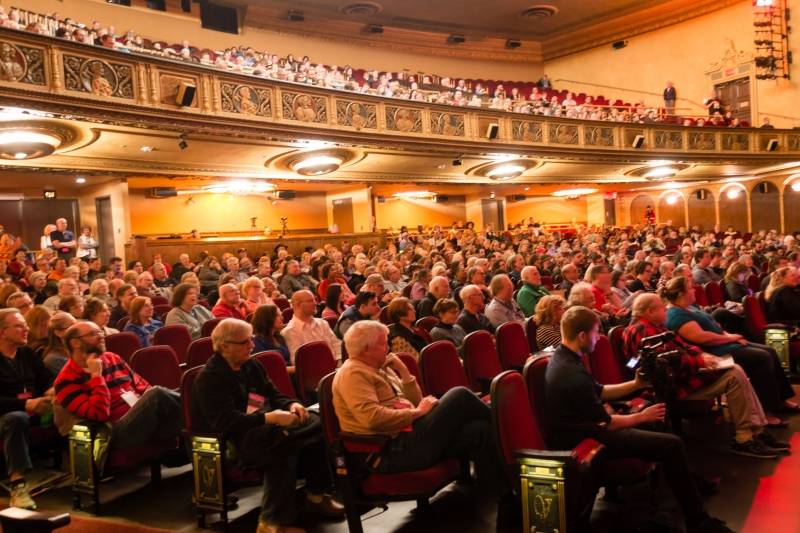
(This audience was actually for Wednesday, but it’s comparable to what I saw on Sunday afternoon.)
SUNDAY, APRIL 17TH
Body & Soul
Reason for going:
Juxtaposition – not an official reason, but it’s the 1st time Ebertfest scheduled 2 silents in one year and I wanted to compare.
As a reward for my efforts to wake after a late night, I got to hear Leonard Maltin slam both the N-G for its ridiculous listicle (“Who says ticket sales are in decline?” he mused to a large-for-Sunday audience) and the idiots who think they are better than De Palma (he encouraged us to meet this film on its level, and not condescend to it, because by laughing at an archaic depiction you demonstrate that you don’t understand the context, aHem, pointed glare). Even though seeing Leonard Maltin at Ebertfest is like buying a Coke at a Taco Bell, he became my favorite person in that moment. Of course, I hadn’t met Renée Baker yet.
Her score to the silent film starring Paul Robeson began with wild drums and vocalizations. It continued non-stop for 80 minutes, controlled chaos and some jazz improv from 16 performers crammed into a pit built for 10, even though she would have preferred to have all 40 pieces present. This woman has more persona and ego than any previous guest, talking about her particular methods, her interest in Micheaux films, her process, zinging Joel Osteen, and the fact that during the performance the instrumentalists don’t get to see the screen because hers is the only opinion which matters. I could have listened to her for hours, and I’m looking forward to seeing what she does with a Japanese horror film from 1915.
Closing remarks
As everyone got up to leave, there was little to say except to thank us again for being the best audience in the world, and to confirm that there are plans in place for Ebertfest 19. “See you next year,” said Chaz. I definitely will.
About Rebecca Knaur…
As Arts Editor for Smile Politely, rebecca spent most of the week at Ebertfest, and actually handed out a couple business cards since pronouncing her name doesn’t help you find it on the Internet.
All images by Sam Logan, unless otherwise credited.








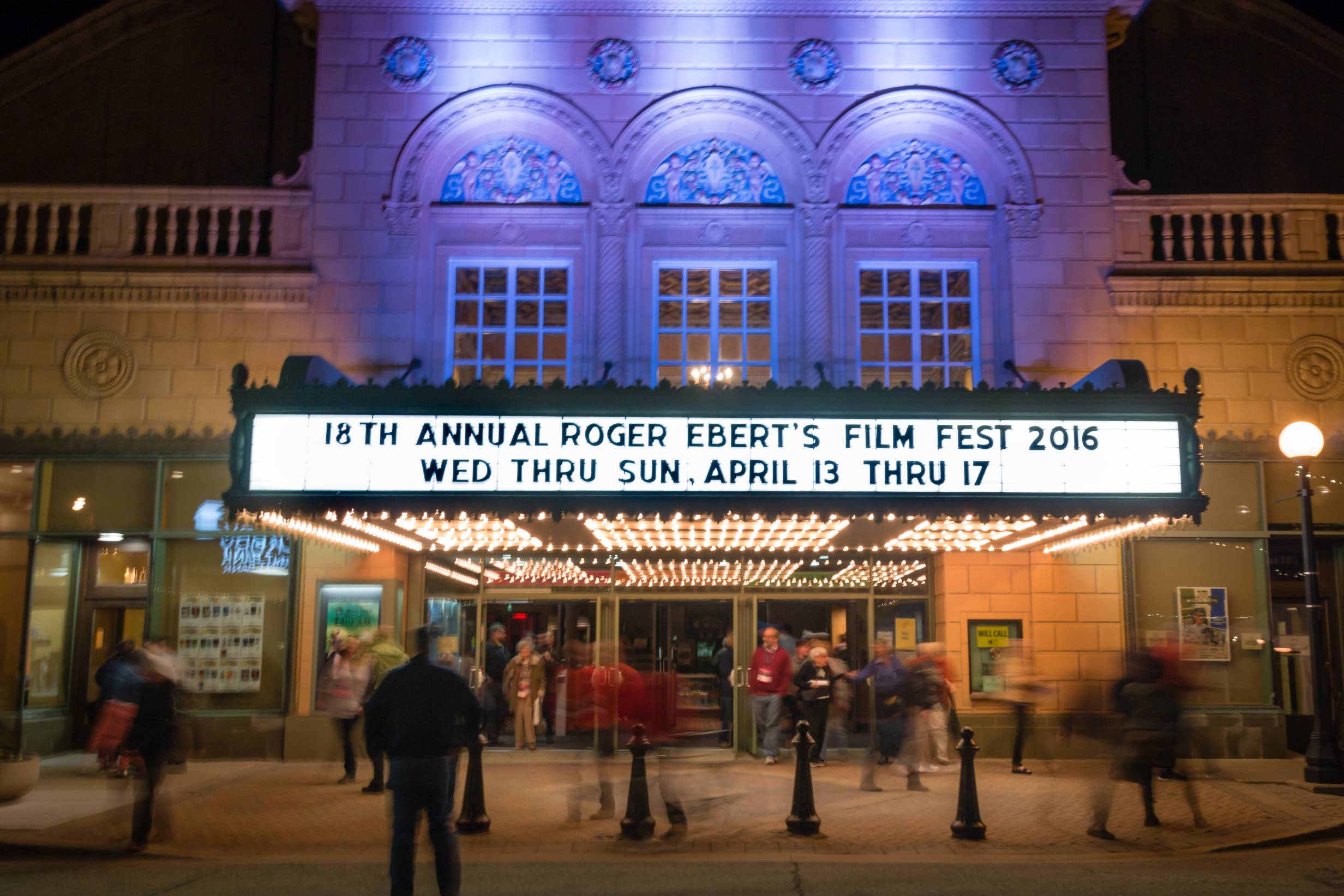
 About Rebecca Knaur…
About Rebecca Knaur…